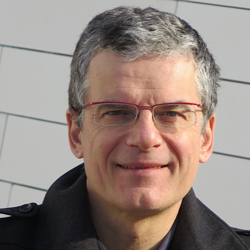Graduate Seminar Series
March 24, 2023
10:00 a.m. ET
March 24, 2023
10:00 a.m. ET
To create metallic scaffolds or microlattices with sub-millimeter strut architectures, we develop a new method, Extrusion 3D-Printing, consisting of two simple steps. First, metal oxide particle suspensions (inks) are extruded, in air and at ambient temperature, into linear struts creating self-supporting lattices. Second, the oxides are hydrogen-reduced to metal and sintered into dense metallic microlattices.
We describe here micro-lattices made of pure metals – copper, iron, nickel or tungsten - created from inks consisting of the respective metal oxides. In all cases, thermochemical reduction and sintering of the 3D-printed oxide scaffolds results in large shrinkages (up to 80% by volume) but without cracking or distortion, as investigated via in-situ x-ray tomography.
We also demonstrate metallic alloys, using blends of oxides: Fe-20Ni-5Mo (a steel) and Co-Cr-Fe-Ni (a high-entropy alloy) and study, via in-situ x-ray diffraction, the interdiffusion resulting in homogenous alloys. Finally, we present more complex tungsten geometries, i.e., gyroids with triply periodic minimal surfaces.
 David Dunand received his BS/MS degree at the Swiss Federal Institute of Technology (ETH, Zurich) in 1986 and his Ph.D. from the Massachusetts Institute of Technology (MIT) in 1991, both in materials science and engineering. After serving on the MIT faculty, he joined Northwestern University (NU) in 1997 where he is Professor in the Department of Materials Science and Engineering. His research focuses on the processing, microstructure and mechanical properties of metallic alloys, composites, and foams. Dunand is a fellow of TMS and ASM International, the recipient of the 2009 Distinguished Scientist/Engineering Award (Structural Materials Division of TMS), the 2012 winner of the Materials Science & Engineering A Journal Prize, and twice a departmental Teacher of the Year at NU. He is co-founder of NanoAl, LLC, a start-up aluminum company which was acquired in 2018 by Unity Aluminum, now part of Steel Dynamics, Inc.
David Dunand received his BS/MS degree at the Swiss Federal Institute of Technology (ETH, Zurich) in 1986 and his Ph.D. from the Massachusetts Institute of Technology (MIT) in 1991, both in materials science and engineering. After serving on the MIT faculty, he joined Northwestern University (NU) in 1997 where he is Professor in the Department of Materials Science and Engineering. His research focuses on the processing, microstructure and mechanical properties of metallic alloys, composites, and foams. Dunand is a fellow of TMS and ASM International, the recipient of the 2009 Distinguished Scientist/Engineering Award (Structural Materials Division of TMS), the 2012 winner of the Materials Science & Engineering A Journal Prize, and twice a departmental Teacher of the Year at NU. He is co-founder of NanoAl, LLC, a start-up aluminum company which was acquired in 2018 by Unity Aluminum, now part of Steel Dynamics, Inc.
November 4 2025
7:00 AM ET
US locations
November 4 2025
9:00 AM ET
Materials Science and Engineering
M.S. Program Information Session
Join us online to learn more about becoming part of the graduate student community through our master's degree programs.
Virtual
November 5 2025
4:00 PM ET
Materials Science and Engineering
"What Materials Research Looks Like At Apple,” presented by Carolyn Duran
Doherty A303
November 7 2025
12:45 PM ET
Materials Science and Engineering
Adventures in additive manufacturing for space exploration, presented by Daniel Oropeza, University of California Santa Barbara
7500 Wean Hall
November 11 2025
11:00 AM ET
Materials Science and Engineering
"Behind the Scenes with an ACS Editor: Insights into Scholarly Publishing and Manuscript Preparation,” presented by Dr. Raymond Schaak
5201 Scott Hall
November 13 2025
4:30 PM - 6:30 PM ET
Roberts Engineering Hall, Singleton Room, 4th floor